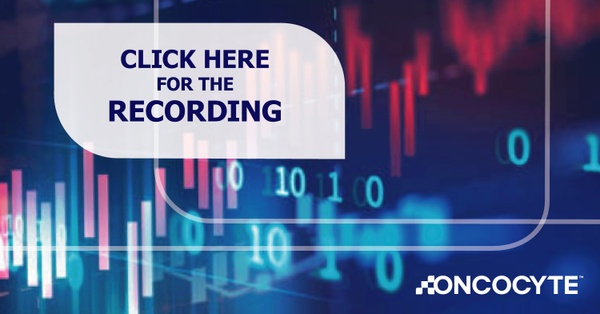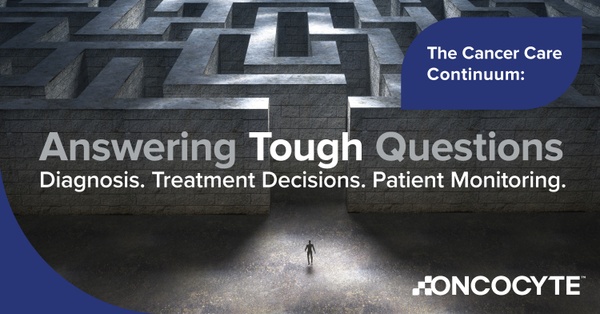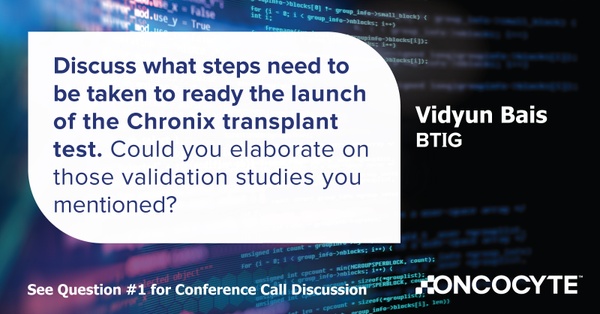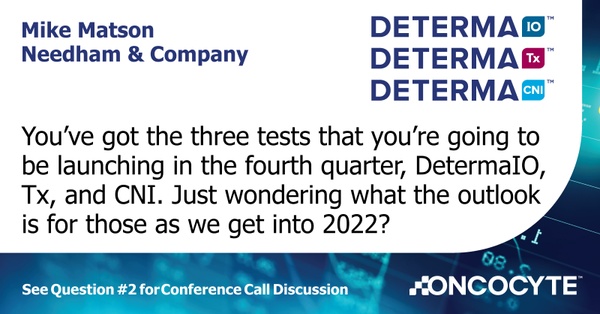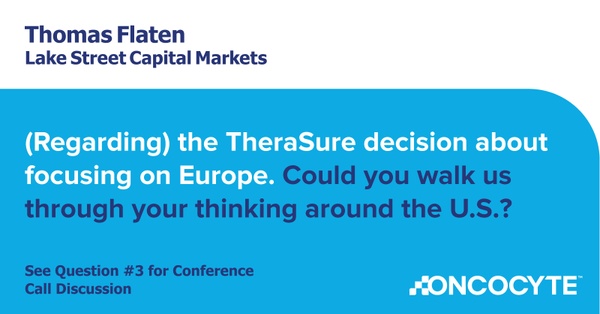
On today’s call, I’ll review the significant progress we continue to make across our initial four growth engines which together, aim to provide a single solution to answer key, outstanding questions for patients and physicians regarding the treatment of solid tumors throughout the patient journey. I’ll also introduce an emerging fifth potential growth engine in the transplant rejection monitoring market, which we believe has the potential to rapidly drive an unexpected additional revenue stream out of Europe. The opportunity in transplant stems from our acquisition in April of Chronix Biomedical, which was driven by the opportunity to use their technology to enter the blood-based monitoring in oncology. But recent developments, which I’ll dive into later in the call, have opened up a new opportunity in the high-value European transplant market.
Our execution through the first half of 2021 continues to be solid with all major initiatives on track despite the ongoing challenges in the Macro environment, and I’m extremely proud of how our professional program management process and dedicated teamwork are bringing us closer to commercializing multiple, innovative molecular tests that together have a Total Addressable Market of over $10 Billion dollars. We believe we are extremely well-positioned for short and long-term growth, and I’m excited to tell you about our progress for the quarter.

Starting off with DetermaRx™, the first and only commercially available test for predicting risk of recurrence and informing the chemotherapy decision in early-stage lung cancer. Despite the continued challenges associated with the COVID-19 pandemic, our progress remains solid with 23% sequential test volume growth in Q2. In the first half of 2021, our test volume has already exceeded our volume for the full year of 2020.
We have continued our expansion into new hospitals, with a total of 176 onboarded hospitals at the end of Q2. That represents an approximate 43% growth over what we reported for Q1. at the end of Q2, we had a total of 317 onboarded physicians, which is a 45% increase over what we reported for the first quarter. Continuing to grow our population of accounts and physicians is a good metric and gives us continued confidence that as the effects of the Pandemic begin to wane, we will see early-stage surgeries for Lung cancer get back to pre-pandemic levels and our volumes grow at an even faster pace.
Right now, between 60-70% of our samples come from patients with Medicare and Medicare Advantage which are covered by CMS and paid within a prescribed amount of time. Private payer samples are slower to be paid, but we are making progress. These efforts, combined with increased sample volumes, the anticipated increase in surgeries as more people get vaccinated, and our salesforce back in the field securing new accounts, leave us confident that our growth with DetermaRx will continue over the coming years.
Along with this growing traction in the U.S. market, our agreement with Burning Rock to distribute DetermaRx in China, the world’s largest market for early-stage patients, is also advancing well. In fact, we recently completed the technical “know-how” and software transfer milestone on schedule, bringing along with it a $1M milestone payment. This remarkable execution, taking place virtually due to COVID, is a testament to the incredible team we have built here at Oncocyte. Our completed tech transfer remains on track for year-end, which will drive further revenue from Burning Rock in 2021. This important progress is just the beginning of our entry into China and will be a solid source of both near-term and long-term revenue growth for Oncocyte.

Let’s turn next to DetermaIO™, our differentiated and proprietary test for immune therapy response prediction, which is the only precision diagnostic test on the market that evaluates the entire immune microenvironment in biopsies and surgical specimens to identify patients likely to respond to immune checkpoint inhibitors. And excitingly, the opportunity with DetermaIO goes beyond improving treatment decisions for individual patients by facilitating the development and clinical validation of next-generation immune therapies by partnering with biopharma and pharma companies.
It’s clear there is a tremendous need, and market, for a better solution to immunotherapy response prediction, and we have been running full steam to advance DetermaIO as rapidly as possible. In terms of data, we have had a steady cadence of data that together provides compelling evidence that DetermaIO has broad potential across a range of tumor types. We are very pleased to announce that results from the NeoTRIP randomized clinical trial (RCT) in triple-negative breast cancer (TNBC) have been accepted for an oral presentation at the ESMO Annual meeting to be held in September. This extremely important study was a randomized Clinical Trial that evaluated DetermaIO as a predictive biomarker for immunotherapy response when administered prior to surgery. Evidence from these RCT studies provides firm evidence of the predictive utility of a biomarker, and we look forward to being able to publish this important trial data. This past quarter, our presentation at AACR demonstrated clinical utility in bladder cancer, in addition to our previous data which show utility in both NSCLC and TNBC. And our presentation at ASCO in June extended the utility of DetermaIO to a fourth tumor type, Renal Cell Carcinoma. As we previously reported, in addition to our validation across tumor types, our studies have also demonstrated the applicability of this test across all four approved immunotherapies: Keytruda, Opdivo, Tecentriq, and Imfinzi. Together, these data provide a strong foundation of clinical data that supports the pan-cancer and pan-immunotherapy utility of the test.
In Q2 we also announced that the solid relationship with the team in Milan for the NeoTrip Trial led to a new collaboration with Gruppo Oncologico del Nord Ovest or GONO for short. They are a leading European clinical trials group that conducts independent Investigator-Sponsored clinical trials for targeted and immune therapies across several tumor types. Our initial work with this prestigious group is in colorectal cancer, an important solid tumor that today has only one biomarker for these treatment decisions, MSI which only identifies <10% of patients eligible for IO treatment. If successful, this will validate DetermaIO in its fifth tumor type, further strengthening the potential for pan-cancer utility
Together, this progress brings us closer to launching the only precision diagnostic that can accurately predict sustained response across five major solid tumors and builds a case for DetermaIO as a pan-cancer predictive test in the $3 billion immune therapy patient selection market.
Importantly, in addition to all of our progress in the research use setting, DetermaIO remains on track for clinical launch this fall. Precision oncology treatment options are rapidly expanding to all solid tumors and across all stages of cancer. Our goal is to become the single and trusted diagnostic company to inform the optimal usage of these treatments for more than 1 million patients diagnosed with solid cancers every year in the US alone. To that end, we will be offering the most comprehensive and differentiated test on the market – DetermaTX - an NGS-based comprehensive genomic profiling (CGP) of over 500+ genes that meets industry-leading gold standards for minimal tissue requirements and rapid turnaround to expedite time to treatment for patients. This test, combined with both the DetermaIO test for immunotherapy and DetermaRx for chemotherapy decisions, will provide a powerful resource to patients and physicians.

Moving on to our Pharma services growth engine. Our pipeline of contracted pharma services projects continues to grow, and we are excited to be a trusted partner for a growing number of top pharma and diagnostic platform companies. And while we have made great progress in securing projects – we are reliant on trial enrollment for our pharma partners to generate samples to run. Because of the dependence on external project timelines and sample delivery, we often face lumpy revenue. This has been exacerbated by COVID because enrollment in all types of trials has been impacted, but despite these headwinds, I’m still pleased to report that our pipeline remains solid and so far in Q3, we are seeing samples for some of our delayed projects beginning to come into our lab in Nashville.
A noteworthy accomplishment in pharma services for the quarter was closing a master services agreement with one of the largest global molecular diagnostic platform companies, which makes our Nashville Lab a primary facility for test development and verification, and validation studies for their full family of PCR and NGS instruments across several disease areas. The agreement was signed in June and our lab has already received and installed several different molecular diagnostic platforms, and work on our first Statement of Work under the MSA started in early July! Gaining large, long-term agreements like this will go a long way to improve the predictability of revenue timing from our Pharma and Diagnostic Services business.
And finally, in the second quarter, we closed four DetermaIO™ Companion Diagnostic Pilot Projects, and samples for 2 of the studies have already started to come in. Obviously, gaining a CDx contract is an important milestone for DetermaIO, and we look forward to sharing an update on those studies in future calls.

Finally, moving to our newest growth opportunities which come from our acquisition of Chronix Biomedical. On our last call, we provided an in-depth review of the TheraSure™ CNI monitor clinical assay, a patented blood-based assay that uses copy number instability, or CNI, for immunotherapy response monitoring in oncology.
Let me highlight the important differentiators for DetermaCNI™.
First off, unlike the emerging Minimal Residual Disease or MRD technologies which require large amounts of tumor tissue, our CNI test is blood only and can be run on all solid tumor cancer patients. Because of the large tissue required by MRD technologies, they remain limited to post-surgical samples only which today is a relatively small population of late-stage patients eligible for immune therapy because the vast majority of later stage solid tumors are treated with neoadjuvant protocols which are pre-surgery and thus, no large amount of tissue available. DetermaCNI is the best choice for managing these pre-surgical patients because CNI does not require a tissue-based genome panel and thus can provide information on disease progression with blood only sampling at the second cycle of Immune therapy, weeks before the MRD methodology can even start their monitoring efforts. Plus, CNI will save payers and patients significant costs over other methods entering the market today.
To accelerate DetermaCNI to market, we’re currently applying the same playbook we successfully used over the last year with DetermaIO, first by rebranding the test as DetermaCNI and second by preparing for expanded commercialization with planned validation studies and publications to support a U.S. research and pharma services launch in late 2021. In the near term, we've established a clinical study plan for DetermaCNI, and we'll complete tech transfer to our lab in Nashville and start marketing to pharma companies in the U.S. later this year.
Immediately upon closing the deal in April, our team began working closely with the Chronix team in Germany and have already made significant progress on advancing studies across several tumor types in the EU, and have well over 1,000 patients under study across several solid tumor types. The acquisition also provided us with ownership of IP that could help develop a foundation for our test for the estimated $6 billion-plus recurrence monitoring market, a repeat testing opportunity that tells a patient and their oncologist that a second tumor may be forming long before it can be identified by imaging. Work on what we will brand as DetermaMx™ is already underway, and we are actively exploring several technology platforms to help us achieve our goal of delivering a recurrence monitoring test for cancer that is extremely sensitive, cost-effective, and can be performed on a digital PCR platform in the community hospital setting where patients are most likely to get monitored. The addition of these new tests brings Oncocyte a distinct competitive advantage as the first and only company to potentially offer a continuum of tests from selecting patients for immune therapy to monitoring the effectiveness of treatment as well as monitoring for recurrence.
Let’s switch gears to a new testing opportunity that we believe will become our fifth revenue growth engine. The IP will we use for DetermaMx was actually developed for use in transplant rejection as the TheraSure transplant rejection monitoring test. We inherited the test already developed and in numerous studies in Europe to detect rejection reactions in organ transplant recipients. Like DetermaMx, the TheraSure transplant monitor test uses only a simple blood draw—making the test easy to administer and potentially much more economical to perform than current tests that require a tissue biopsy. The recent CMS coverage policy for transplant rejection monitoring citing dPCR methods for solid organ allograft rejection, as it's titled, exclusively cites three peer-review publications from Chronix on the performance of our test in solid organ transplant monitoring. This is a HUGE validation of the Chronix technology
Prior to the acquisition, The Chronix team completed several large clinical studies and published over 20 papers in peer-reviewed scientific journals, including the recent publication in Nature, that validated the test across the top three solid organs -- Heart, Kidney, and in Liver where we have an uncontested opportunity since currently there is no test for early detection of organ rejection. Diving in a little deeper, the studies completed to date show that transplant rejection is associated with increased release of “graft DNA”, known as donor-derived DNA, into the bloodstream. The Chronix data presented to date shows distinctly that donor-derived-DNA monitoring using digital PCR can facilitate personalized immunosuppression treatment, and potentially decrease premature graft loss by detecting injury BEFORE clinical manifestation. This allows treatment of acute rejection and other causes of graft injury which has the potential to significantly improve organ transplant outcomes in patients.
As we learned more about the differentiated approach and heard feedback from the market in Europe, we took a pause on our previously planned approach to selling the IP and began a deep dive into the viability of bringing the test to market under the OCX banner. Our work illuminated that this is clearly an enormous revenue opportunity for Oncocyte! To ensure we stay focused in the US on our product development in oncology, with numerous critical milestones for DetermaIO, TX, and CNI on the horizon, we will focus our launch for the Therasure assay for transplant rejection in the EU where we already have a contracted relationship with a lab partner.
There are about 41,000 transplants annually in Europe with over 150,000 on waiting lists and a rate of 48,000 registrants added per year. Our estimates of the Total Available Market for Europe are approximately $1B, and we have a head start given Chronix’s European IP and work to date with key opinion leaders who are interested in working with us to bring the test to fruition across Europe. We have already begun the process of standing up a separate Business Unit for transplant and given the concentrated network of transplant centers in the EU and our approach of using established molecular labs, do not expect it to significantly increase our quarterly burn. Our strategy is simple, bring the test up and launch as an LDT in the first half of 2022 with carefully selected partner labs in Europe and concurrently, expedite the process to find an instrument partner to help complete digital PCR Kits and platform studies under the prescribed regulatory process for the EU and submit for regulatory approval in Europe by late 2022.
We have covered a lot of ground today, so let me close by summarizing… I continue to be extremely enthusiastic about the continued progress we have made to date and what we expect to see over the next 4 quarters including rising sample volumes and revenues for DetermaRx and Pharma Services, and at least three product launches DetermaIO and DetermaTx for the US clinical market in early Q4 and DetermaCNI in the US for the pharma clinical trial market in Q4. In a very short time, we have built a compelling and powerful portfolio of molecular diagnostic test assets with a large total market opportunity of over $10 billion, and we have proprietary positions in some of the fastest-growing areas of molecular oncology and now, in Transplant Rejection monitoring. We continue to attract the attention of leading pharmaceutical, biopharma companies, and molecular diagnostic tool platform providers and look forward to important contracts on the horizon with these global partners to strengthen our market position.
The progress we have made over the past 18 months despite the headwind of a global pandemic has been nothing short of amazing and is a testament to our dedicated, experienced team! We have built a world-class organization that I am proud of and thankful for every day as we advance our comprehensive diagnostic platform for cancer and beyond.

Q&A:
Vidyun Bais - BTIG: I was wondering if you could discuss what steps need to be taken to ready the launch of the Chronix transplant test. Could you elaborate on those validation studies you mentioned? And I was also wondering, is that test already kittable now? Or what additional work needs to be done there?
Ronnie Andrews: Yes. Good question. Let me answer that. When we acquired Chronix, they were way down the road on commercializing in Europe. And so they have an arrangement, as Mitch said, with a molecular lab in Northern Europe called Amedes. We are actively engaged with Amedes and believe that they are the right lab for Northern Europe to launch the test as an LDT. We are venturing to Europe in a month or so, and we're going to be looking for and have identified a few potential partners for Southern Europe. So our goal is to launch it as an LDT in the European market immediately as we bring the test up for those accounts to go and begin active marketing in the various countries that they will be responsible for. The kitted process is a process that's been identified. And to be candid, the test has to be put through that same process today to be run as an LDT.
For us, it's going to be more about documenting under design control, the process, and then running studies that will correlate the kitted product to the LDT studies that are already published. As I said, there are over 20 of those today out there. And so we feel pretty confident that we'll be able to have a kitted product dossier ready to submit for IVDR, which is the European version of the FDA, by late 2022.
Our goal between now and then is to also find a platform partner. There are several of those, Bio-Rad, Thermo Fisher, and Roche, who have indicated an interest in potentially being our platform partner, and we'd like to secure that partnership as we go into the fourth quarter so that when we start the design control studies to get our dossier ready for submission, we will be doing it on a single platform with a partner that already has a pervasive installed base in Europe.
Vidyun Bais - BTIG: Okay. Great. If I could just add a follow-up, what are your dollar amount expectations for reimbursement in Europe?
Ronnie Andrews: For the transplant assay?
Vidyun Bais: Yes.
Ronnie Andrews: Yes. You know what, we haven't publicly given those yet, but we do know the market is large. And depending on when we actually are able to take the product to market, we do believe there's a pent-up demand based on our discussions with key opinion leaders. Chronix has done a really nice job of fostering relationships with some of the top transplant centers in Europe who seem to be extremely interested in the product, given it's going to improve the turnaround time versus sending the test out.
Being able to do it on-site, will significantly improve the turnaround time, which, as we're hearing from our market voice, is the real critical attribute of our test versus the current tests that are being offered in Europe, in that these centers, when it's kitted and they can run the test the same day the patient comes in, they'll be able to give immediate feedback to the patient as to whether there is potential organ rejection. And so, given that and given that we expect the reimbursement levels in the European market to be less than the U.S., we do still believe it's about $1 billion markets versus the $2 billion, $2-plus billion market here in the U.S.
We are excited about the opportunity. And as we start to get the test into the market, we'll be able to give you a better forecast of when revenues will start and what they'll look like.
Vidyun Bais: Okay. Awesome. You've also talked about working with a third party for kitting for a therapy selection panel. Around what time would you expect to announce this? And is it possible that this could include a co-promote or a commercialization agreement from the third party to sell this test?
Ronnie Andrews: Yes. Good question. We have completed our decision on the DetermaTx company. That decision was made. That test is in process of being brought up on the platform we chose. We are obviously interested in a potential platform relationship globally with that company. So we're going to leave it unnamed today because we're in negotiations. But I think the idea is that we will have a TX test in the fourth quarter to complement DetermaIO, and we are working with that vendor for a potential broader kit opportunity ex-U.S.
Mike Matson - Needham & Company: Yes. Thanks for taking my questions. You've got the three tests that you're going to be launching in the fourth quarter, DetermaIO, Tx, and CNI. Just wondering what the outlook is for those as we get into 2022? I know you're not going to give you specific guidance, but which of those do you think can ramp the fastest and why?
Ronnie Andrews: Yes, it's a great question. Padma's here, so I'm going to give you a little high-level Ronnie thoughts, and I'll let Padma give you a little more of the details about how we're going to market.
We are going to launch the two in tandem. The feedback from the voice of the customer has been, “We want a one-stop-shop, we don’t want to split the tissue sample and send it to one company and one to another. So if you're bringing up a targeted panel and an IO panel, we want to be able to go to you and your lab to get that, and we want that turned around in seven to 10 days”, which is our commitment to these clients. And so our strategy is to launch in the fourth quarter with a series of key opinion leaders.
Padma, why don't you take it from there and just give a quick thumbnail of the go-to-market strategy and what we expect in terms of when we expect to go to CMS for reimbursement on IO.
Padma Sundar: Yes. We are on track for launching this one-stop-shop test. The idea behind this is that we would have a large comprehensive panel with over 500 genes, so best-in-class comparable to leading panels by companies like Foundation and Karis. The idea is for the same amount of tissue and with a faster turnaround, you'll get everything you get from other targeted panels, but the differentiator, which only we will offer on that same sample, will be the DetermaIO, and we believe that will be a winning strategy. The idea is to go to market in Q4, starting with an early access program with some of the key early adopter sites that we already know thanks to our DetermaRx product, and then drive adoption ahead of CMS reimbursement through that early access program. And that's the strategy for 2022.
I've been actually traveling since the market has opened up a little bit in the Northeast and the South, and there's a big interest because doctors are very intrigued by the DetermaIO data, and they say, “Instead of sending it to these bigger companies, if I can get all the answers from those bigger companies plus IO, why not use OncoCyte”.
In terms of CMS, the CMS coverage path for DetermaTx is pretty clear, because there's a clear path for NGS tests and what they're looking for is just analytical validation. Once you complete it satisfactorily, then you get the coverage within 90 days to six months of submitting that package, and the coverage ranges from $2,200 to $2,900 for an NGS panel. For DetermaIO, they are looking for us to get a couple of peer-reviewed publications in lung and breast cancer. We've had conversations with them. Once we have those peer-review publications, then the path for reimbursement for that test is quite similar to what we had for Rx and quite clear. So that's the path to launching the test. The first goal is to gain adoption in 2022 and then submit the dossiers; the Tx dossier will go first, followed by the DetermaIO dossier so that we're in a good position to get paid to start 2023 for both sides.
Mike Matson: Okay. That's helpful. And then a couple of questions on China and the Burning Rock deal. I understand you're getting these milestone payments in the near term, but when do you expect to really start to see some revenue from royalties from the sale of the product? That's the first part of the question.
The second part would be, is there a potential for Burning Rock to distribute any of these other products like Tx or CNI in China?
Ronnie Andrews: Yes. So quick answer is that they are being very aggressive with the plans to launch Rx into the Chinese market, so we expect that we'll see royalty revenues from that in 2022. Obviously, they'll be launching at the beginning of the year. So by midyear, with their—they have a very pervasive commercial force in China. We expect to see meaningful revenue by mid-year and growing over time, obviously.
In response to the second question, DetermaIO is a different animal than the DetermaRx, because it's pan-cancer, and we believe we can kit it. It may be most advantageous for us in China given the broad use of immune therapy, and given that Burning Rock as a lab may have limited penetration potential, that we might either take a two-pronged approach, which would be a partner with Burning Rock and a platform company, or we might just partner with a platform company if we got the right deal and they had the right install base in China.
The jury is still out on that. But if we launched IO, we want to launch it with the DetermaCNI as well. Keep in mind, our go-to-market strategy is to be the only company in the industry that can offer a predictive test for determining sustained response immune therapy, and then following that right up with a blood test to monitor whether the therapy is actually working, a really important nuance. And we believe that's best exploited on a platform where a lab can run both tests simultaneously with the patient to start the monitoring immediately upon therapeutic initiation.
Mike Matson: Okay, got it. Thank you.
Thomas Flaten - Lake Street Capital Markets: Hi, thanks for taking the questions. Ronnie, I was wondering if you could go back to the TheraSure decision about focusing on Europe, which makes a lot of sense. Could you walk us through your thinking around the U.S., given the benefit around the LCD that already exists, and timing? And just some more color on how you're thinking about that.
Ronnie Andrews: Absolutely. Europe already has an infrastructure. Chronix had it to move rapidly. So we're going to move on that, and that makes a lot of sense. We're still a small team, and we're trying to effectively execute a lot for a small team. And when we sat around and talked about the timing of transplant in the U.S., it really, we decided, would be, instead of an LDT approach, we felt like it's probably best in the U.S. to launch as a kitted strategy, and therefore we need to execute this relationship with a platform partner, hopefully, one that's already in the transplant world or has a pervasive deployment of instrument platforms, either in HLAR and other types of testing done in transplant world, so that we could have a partner to go to market in the U.S. without hiring a sales force to go have to attack this. But that decision is still open, Thomas.
We just decided that given all that's on our team's plate, and I can't afford the distraction, because oncology is our franchise. It is the biggest growth engine we got, and it's powerful. So for us, we want to make sure I have all the wood behind the tip of that arrow as we go into the market with IO and CNI, and Tx. But we'll get back to you, probably by the third-quarter call, hopefully, we'll have solidified the relationship with the platform player. And at that point, we can give you a better estimate of when we might be in the world of kitting it and bringing it to market as a democratized tool for transplant centers in the United States to provide same-day turnaround time of this important information.
Thomas Flaten: That's great. I appreciate that. And just one quick one for Padma. Could you give us a quick update on the sales force? Where you are in terms of hiring, etc.?
Padma Sundar: Yes. We haven't added to our sales force this quarter. So we still have 10 reps that cover about 70% of the addressable market. What we've actually done is, we've been able to get some outstanding analytical data that we purchased that directs that sales force even more efficiently that highlights the top surgeons by volume in those regions, and also maps out their referral oncology network. So we felt that with that database that we recently purchased on CMS data, we have armed our sales reps with more leads than they can pursue.
Now in terms of adding more sales reps, I think a great opportunity to do that will be as we launch our next products into medical oncology. We are going to optimize how we do this, because like we said before, our current sales reps do have these medical oncology connections, especially in lung. And through that, in some of these large community systems where many of these doctors treat multiple cancers, we'll be able to reach out to oncologists who treat not only lung but other cancer types where we have DetermaIO data.
We feel that we can launch DetermaIO, plus Tx, in the fourth quarter and maintain momentum with a modest increase in sales force of about 3% to 5%. That's the strategy for this year and next year.
Ronnie Andrews: Thomas, we may add a few sales folks in Europe for transplant. They would be not direct force. They'll be more, what I would call, med-ed type. But we'll talk more about that in third quarter. I certainly think that that's probably an option for us to accelerate to market for transplant.
Ronnie Andrews - Closing Comments: Okay, everybody. Well, thank you very much for your time today. Again, we appreciate your patience as we go through the incredible work that's going on here and giving you an update. Really appreciative, as I said, to the team here. They continue to be heroic in their efforts despite what's going on around us in the environment. We look forward obviously to a solid Q3 and the chance to give you an update on some of these projects as we go into Q3 and through Q3, as well as at our Q3 call.
So everybody stay safe, and we look forward to connecting with you. We have a number of investor conferences coming up through the quarter, and we look forward to seeing many of you at those. Take care, and have a great day.
Oncocyte is a precision diagnostics and monitoring company with the mission to improve patient outcomes by providing clear insights that inform critical decisions in the diagnosis, treatment, and monitoring of cancer. The Company, through its proprietary tests and pharmaceutical services business, aims to help save lives by accelerating the diagnosis of cancer and advancing cancer care. The Company’s tests are designed to help provide clarity and confidence to physicians and their patients at every stage. DetermaRx™ identifies early-stage lung cancer patients who are at high risk for cancer recurrence and who may benefit from adjuvant chemotherapy. DetermaIO™, a gene expression test currently used as a research-use only tool, assesses the tumor microenvironment to predict response to immunotherapies. The Company’s pipeline of tests in development also includes DetermaTx™, which will assess the mutational status of a tumor; blood-based monitoring test DetermaCNI™, and long-term recurrence monitoring test DetermaMx™. In addition, Oncocyte’s pharmaceutical services provide companies that are developing new cancer treatments a full suite of molecular testing services to support the drug development process. DetermaRx™, DetermaIO™, DetermaTx™, DetermaCNI™ and DetermaMx™ are trademarks of Oncocyte Corporation. Keytruda®, Opdivo®, Tecentriq® and Imfinzi®, are registered trademarks of Merck, Bristol Myers Squibb, Roche Genentech and AstraZeneca, respectively.
Oncocyte Forward-Looking Statements
Oncocyte cautions you that this press release contains forward-looking statements. Any statements that are not historical fact (including, but not limited to statements that contain words such as “will,” “believes,” “plans,” “anticipates,” “expects,” “estimates,” “may,” and similar expressions) are forward-looking statements. These statements include those pertaining to DetermaIO, including its potential to serve as a predictive biomarker, and companion diagnostic, for immune therapy response prediction; its capacity to work as a companion diagnostic across the checkpoint inhibitor class of therapies and both benefit drug development and add precision to patient treatment decisions; its potential pan-cancer and pan-immunotherapy utility in both primary and metastatic settings; its expected clinical launch in Q4 2021; its potentially unique and pivotal role versus other tests in selecting patients for immunotherapy; its potential to find the right treatment for the right patient with specificity for response; and other statements about the future expectations, beliefs, goals, plans, or prospects expressed by management. Forward-looking statements involve risks and uncertainties, including, without limitation, the potential impact of COVID-19 on Oncocyte or its subsidiaries’ financial and operational results, risks inherent in the development and/or commercialization of diagnostic tests or products, uncertainty in the results of clinical trials or regulatory approvals, the capacity of Oncocyte’s third-party supplied blood sample analytic system to provide consistent and precise analytic results on a commercial scale, potential interruptions to supply chains, the need and ability to obtain future capital, maintenance of intellectual property rights in all applicable jurisdictions, and the need to obtain third party reimbursement for patients’ use of any diagnostic tests Oncocyte or its subsidiaries commercialize, and risks inherent in strategic transactions such as the potential failure to realize anticipated benefits, legal, regulatory or political changes in the applicable jurisdictions, accounting and quality controls, potential greater than estimated allocations of resources to develop and commercialize technologies, or potential failure to maintain any laboratory accreditation or certification. Actual results may differ materially from the results anticipated in these forward-looking statements and accordingly such statements should be evaluated together with the many uncertainties that affect the business of Oncocyte, particularly those mentioned in the “Risk Factors” and other cautionary statements found in Oncocyte’s Securities and Exchange Commission filings, which are available from the SEC’s website. You are cautioned not to place undue reliance on forward-looking statements, which speak only as of the date on which they were made. Oncocyte undertakes no obligation to update such statements to reflect events that occur or circumstances that exist after the date on which they were made, except as required by law.
For more information, please visit https://oncocyte.com/ or follow us on Twitter at @OncocyteCorp, Facebook, and LinkedIn.

